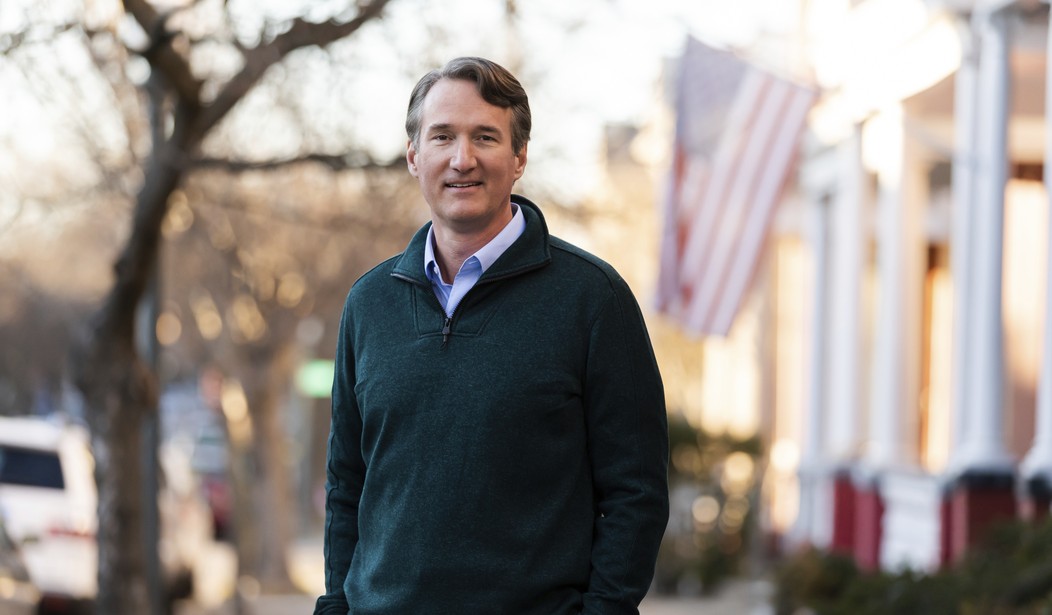Virginia is one of two states that will hold gubernatorial elections this year, and it’s the only state that’s likely to feature a competitive race, since Phil Murphy is heavily favored to win re-election in New Jersey. Democrats in Virginia won’t pick their nominee until June 7th, but Republicans in the Old Dominion have already decided on Glenn Youngkin as their standard-bearer.
Youngkin emerged as the candidate in a convoluted ranked-choice convention, and has managed to bring together the disparate wings of the Republican Party, gaining the endorsements of both established politicians like Del. Kirk Cox and self-described “Trump in heels” Sen. Amanda Chase, who had previously threatened to run as independent if she didn’t win the primary. Republicans are coalescing around Youngkin, and that has Democrats nervous, even in a state that’s been trending blue for over a decade and last elected a Republican governor in 2009.
Enter the Washington Post, which has a story today accusing Youngkin of “going mum” on issues like abortion and the Second Amendment after winning the nomination and pivoting towards the general election.
At a rally Monday night in Prince William County, one of the Northern Virginia suburbs where Youngkin needs to hold down Democratic margins, he focused on the classic trio of kitchen-table issues: jobs, schools and public safety. He made one veiled reference to gun rights, promising to defend unspecified constitutional amendments. He said nothing about abortion.
Asked during an interview with The Washington Post on Friday how he would like to change state laws on gunsand abortion, Youngkin repeatedly evaded the topics. When pressed, he noted that he is “pro-life” and that he will “stand up for our constitutional rights.” But to every request for specific policy goals on abortion and guns, two of his signature issues, Youngkin offered the same jobs-schools-safety mantra.
“I said the things I’m going to focus on right out of the box — getting our job machine cranked up, focusing on schools and focusing on law enforcement,” he said. “Right out of the box, that’s where we’re going to spend our time. And I know the media wants to absolutely try to find these wedge issues that separate people.”
The reality is that even if Youngkin wins in November and has long enough coat tails to return Republicans to the majority in the state House of Delegates, the state Senate is still going to be controlled by Democrats (state senators aren’t up for election in the state until 2023). That makes repeal of the new gun control laws that Democrats have imposed on gun owners over the past two years a long-shot at best, at least for the first two years of Youngkin’s term. It shouldn’t come as a surprise, then, that Youngkin isn’t talking up repeal on the campaign trail.
However, once the Democrats have settled on a nominee, Youngkin will have plenty of opportunities to paint a stark contrast between himself and whoever the Democrats pick as their candidate. Terry McAuliffe, who’s the most likely to get the nomination, has already called for a ban on modern sporting rifles, and he’ll provide a good foil for Youngkin in the months ahead.
Would I like to see Glenn Youngkin talk more about Second Amendment issues on the campaign trail? Of course, but it’s still early. After the Democratic candidate has been decided, Youngkin can target voters with a simple, yet effective message: Candidate X wants to make life hard for law-abiding gun owners and go easy on violent criminals, while Glenn Youngkin wants to focus on violent offenders and leave legal gun owners alone.
Given the scandal in the Democrat-controlled Pardon and Parole Board, Youngkin has a lot to work with:
The problems at the parole board are broad. The Office of the State Inspector General in 2020 found violations of policy and law in how [former Parole Board chairwoman Adrianne] Bennett and the board handled the release of at least eight convicted killers. The watchdog agency began its investigation after receiving complaints through a state hotline.
Reporting by The Times-Dispatch this year showed that Bennett also released more than 100 parolees from supervision without any recommendation from local parole officers. And the newspaper reported that in one case she directed parole board notifications to be turned off for the surrogate grandmother of a 17-year-old girl, Gwendolyn “Angel” Thomas, who was murdered by her 27-year-old boyfriend in 1992. After initially denying parole in 2020 to the boyfriend, Hugh Joseph Brown, the parole board reconsidered and released him.
In another murder case, a parole board staffer seemed fearful about simply updating a victim’s family about a case, and an important letter the parole board sent to the widow could not be found.
As the inspector general continued its investigations of the parole board, Gov. Ralph Northam’s top officials called the watchdog to a meeting in August. OSIG reports to the governor, who also appoints the five parole board members.
State Public Safety Secretary Brian Moran and others reprimanded Inspector General Michael Westfall for how many investigations his office was conducting and questioned whether he even had the power to investigate, according to a recording of the meeting The Times-Dispatch reported on last month. Westfall told his colleagues after the meeting that the situation made him fear for his job security.
Bennett is no longer the head of the Parole Board because her fellow Democrats appointed her as a judge last year, which gives more fodder to Youngkin as he portrays Democrats as the party that coddles criminals at the expense of law-abiding gun owners and victims of violent crime.
Youngkin hasn’t said much about the Parole Board scandal on the campaign trail either, yet the Washington Post certainly isn’t going to chastise him for keeping mum about that topic. For the moment, Glenn Youngkin is introducing himself to voters across the state, but once he knows who his opponent will be in the general election, I suspect we’ll be hearing a lot more about the Second Amendment, violent crime, and stark contrast between Republicans and Democrats when it comes to the bearing arms in self-defense and going soft on actual criminals.









